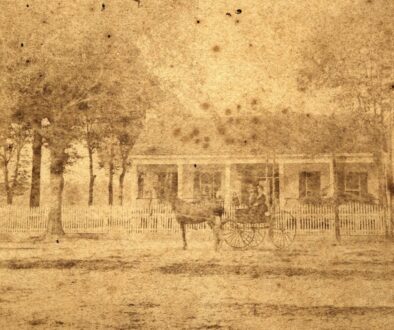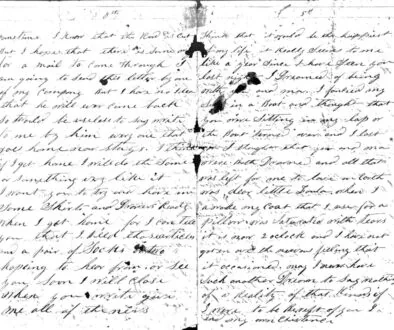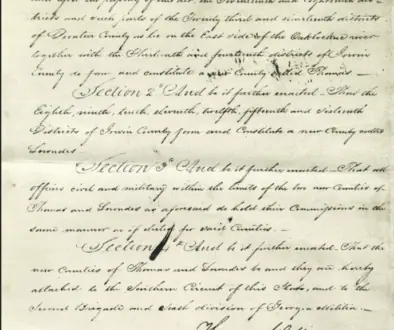Problems with Peter: The Peter Dekle Letters
Here at the History Center, we like to supply our collections department interns and volunteers with interesting projects that illustrate what life in Thomas County’s past was like for her citizens. We have many letters, records, diaries, and documents that give sneak peeks into the daily lives of people who were more like us than we may realize.
One of our recent interns, Kayla Reeves (who recently attained her bachelor’s degree in history from Florida State University), was tasked with transcribing a collection of letters from Private Peter Dekle (1836-1863) to his wife Susan Dunbar Dekle (1839-?) of Thomasville. Peter’s letters span from April of 1862 to August of 1863 when he served in the Confederate Army in Company F of the 29th Infantry. For most of his military service, Peter was stationed around Savannah but was later sent to North Carolina and Mississippi before he was wounded at the Battle of Chickamauga. After several months, he succumbed to his injuries; however, the whereabouts of Susan following her husband’s death are currently unknown.
Here’s what Kayla had to say about Peter and his letters to Susan:
“As a drafted soldier, Peter did not generally discuss ideological reasons behind the war in his letters, rarely mentioning secession or even regional animosity. However, Peter’s letters provide valuable insight into the experiences and mentality of an average soldier, demonstrating themes of homesickness, despair, adventure, and adjusting to the general monotony of camp life.”
In this blog series, Kayla explores some of these themes with excerpts from Peter’s letters. Please keep in mind that Peter was writing in the language and attitudes of his time which we now consider to be racist and prejudice.
Spelling and Grammar
In many cases, Peter Dekle was a phonetic speller—meaning that in his writing, he often spelled words as he would have heard and spoken them aloud. Being part of a burgeoning upper-middle class in recently settled Thomas County, Peter likely received his education from his mother and older siblings. His writing shows the syntax of a person who has learned to read and write in the style of the time but should have spent a little more time on his spelling. Through his written words, Peter’s thick Southern accent shines through the page, allowing the reader to feel as though they were speaking with Peter himself.
Here are some examples of words where Peter’s accent shines through. In his letters, he always began by thanking his wife for her “kine (kind) correspondence” (note that Peter burned her letters, so we do not know what she wrote). Other words Peter frequently mispelled were “wosh” (wish), “wornt” (wont), “mought” (might) and “awlwais” (always). He also described instances of feeling “asshoim” (ashamed). In speaking of camp life, he described fellow soldiers being taken to the “hars pittle” (hospital) and sleeping in the “Barrax” (barracks).
If Peter needed to brush up on his spelling, his punctuation also needed some attention. His use of periods and commas (or the complete lack of them) complicates reading for modern audiences but also illustrates his stream-of-conscious writing style. Some letters breeze through the entire message at a rapid pace without a comma or period to allow the reader to take a breath. Was he in a hurry? He talks about how slow camp life was so that’s likely not the answer. Perhaps his lack of punctuation betrays a certain absent-mindedness adopted to help him cope with long hours of sitting around in camp with nothing to do but think of home. We may never know for certain, but a glimpse at Peter’s writing style tells us more about his personality and background than we could learn from traditional documents.




